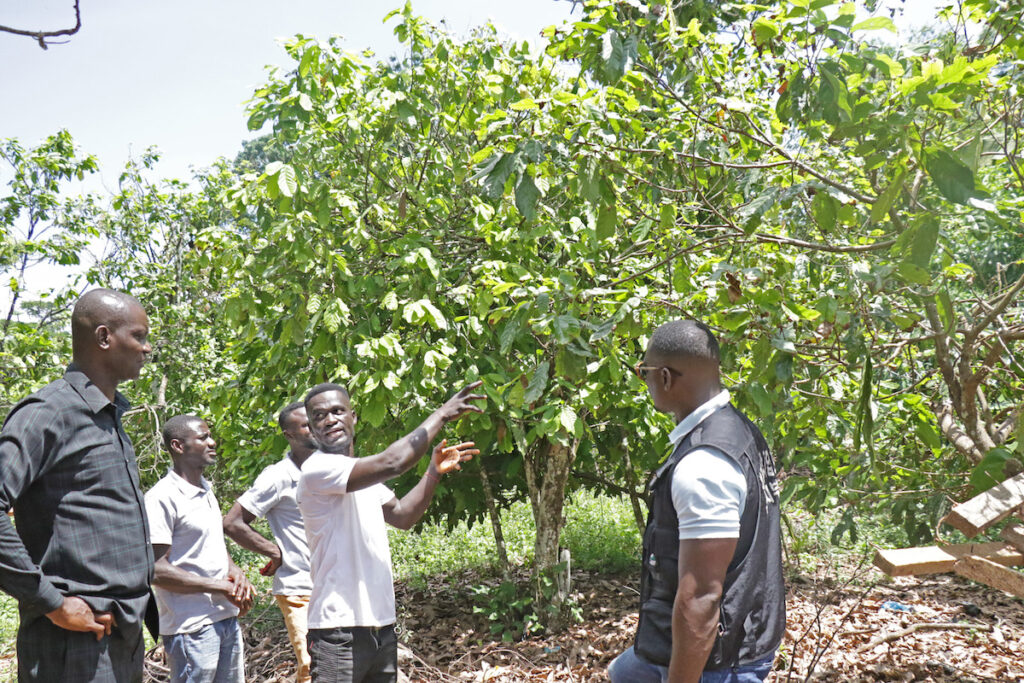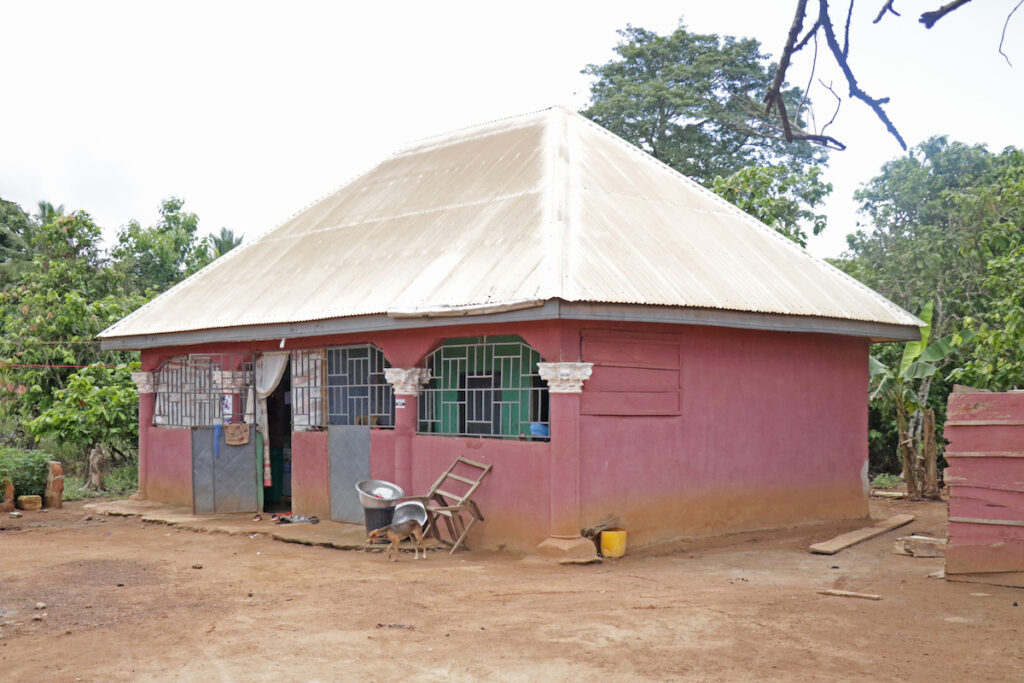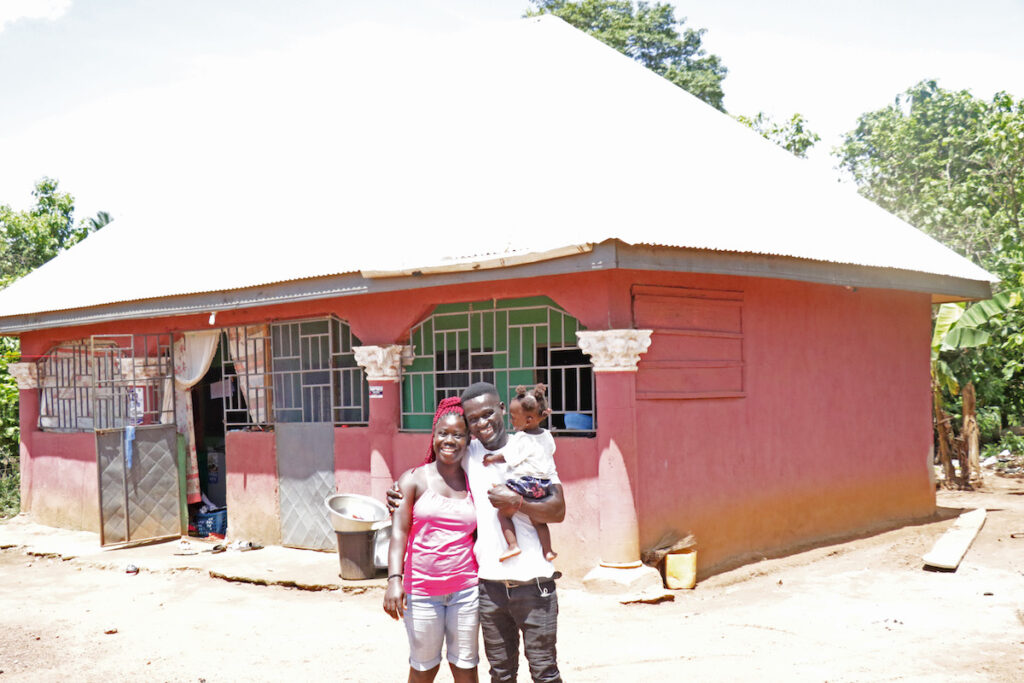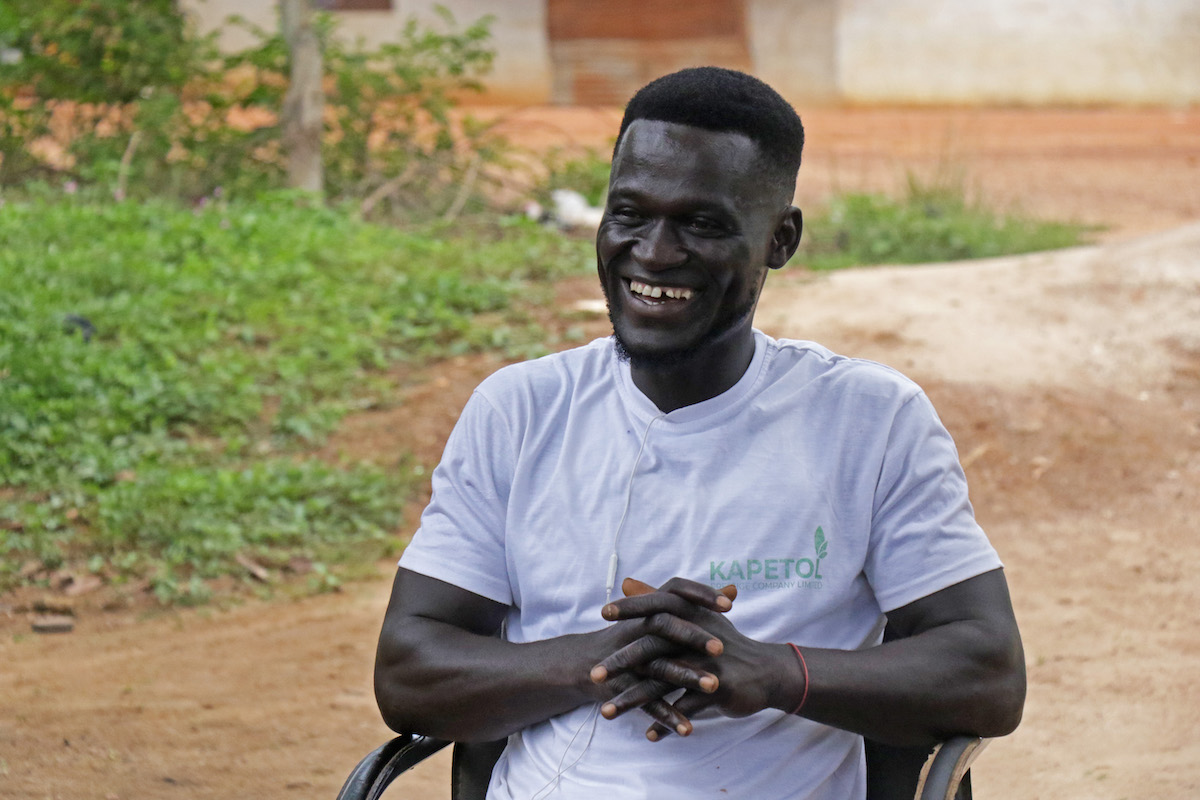Elvis Adu Boahen has found success working within the cocoa value chain.
Growing up, Elvis Adu Boahen never contemplated a future in agriculture. The economic hardships his parents endured on the family cocoa farm made him look for opportunities far removed from the land surrounding his village in Ghana’s Ahafo region. However, all things change, and today Elvis is 29 years old, married with a three-year-old daughter, and has a career steeped in cocoa.
Similar to many young men in his community, Elvis aspired to a life in the city. He dreamed of the city’s lucrative business opportunities, and he imagined that money would be the key to a meaningful and fulfilled life.
In 2013, after he finished high school, Elvis moved to Accra, Ghana’s capital city, but his money-making dreams were quickly dashed. Instead of glitz and glamor, he found himself hawking ice cream on busy city streets.
Those were very difficult times for me. I was, however, determined to break the poverty cycle and make something of myself. Due to the high cost of living in Accra, a few hawkers and I rented a room meant to accommodate two people, at most, to serve as accommodation for 10 of us.
Elvis Adu Boahen
After a year in Accra, Elvis needed a change. The ice cream business had taken a downturn and his accommodation had been flooded and was uninhabitable. Taking stock of his situation, Elvis headed back to his village of Betodar where his sister shared information on the Next Generation Cocoa Youth programme, or MASO, a project that was implemented by Solidaridad and funded by the Mastercard Foundation.

MASO was designed to empower young people living in cocoa-growing communities. The programme helped participants discover entrepreneurship opportunities in the cocoa supply chain, including work as cocoa farmers, input dealers or providers of sustainable farming services.
Elvis’ initial reaction was one of disinterest. He did not see any positive gains to be derived from the programme, and as he says, “In the past, I have witnessed non-governmental organizations come into our community to implement what I consider ‘cosmetic projects.’ They would engage us for weeks, collect data, and we would never hear from them again. I did not want to be another statistic in anyone’s book.”
Eventually, his sister’s encouragement paid off. Elvis attended a MASO event in 2016, and his initial impressions of the programme were overwhelmingly positive.
My first interaction with Solidaridad through the MASO programme was an eye-opener. The facilitators were patient and thorough in their delivery. The depth of information I received convinced me that this would be different from the others I have encountered.
Elvis Adu Boahen
Between 2016 and 2018, Elvis participated in the MASO project and received training in sustainable cocoa production and entrepreneurial opportunities in the cocoa value chain.
“The knowledge I gained from the programme was transformative. For example, my parents’ cocoa farm saw significant yield improvements after applying some of the skills I gained from the programme on their farm,” said Elvis. “This was very exciting for me. I felt proud that my efforts had given my parents more yield and by extension more money.”
Next, he signed up for MASO’s business academy, which provided participating youth with the education and skills needed to set up and run a successful farm management business in the cocoa sector.

By the end of his academy training in 2018, Elvis had started a business providing farm management services for farmers. His initial clients gave him glowing recommendations, and after borrowing money from his mother to repair his father’s old knapsack sprayer, he soon expanded his client list to fifteen farmers.
The Business Academy equipped me with the skills I needed to thrive in any business. The training included the development of business plans, proper bookkeeping, and fundraising.
Elvis Adu Boahen
Demand grew so quickly for his services that it led to labor and equipment shortage. Elvis needed support to expand his business.
In 2019, Elvis received technical assistance under another Solidaridad project: the Women & Youth component of the second phase of the Cocoa Rehabilitation and Intensification Programme (CORIP II). This is another project, implemented by Solidaridad and funded by the Embassy of the Kingdom of the Netherlands, which supports the establishment of small and medium enterprises (SMEs) under the laws of Ghana. This framework allowed Elvis to continue providing farm management services to cocoa farmers.
Elvis’ SME received a recoverable grant totalling 100,920 Ghana cedis ($18,021 USD in 2019) based on a funding arrangement with Marks & Spencer. Elvis used the grant to acquire tools, equipment, and a tricycle to enhance service delivery to the cocoa farmers who made up his clientele. A portion of the grant was also allocated to meet much-needed working capital.
With the support, our revenues went through the roof. We were now able to move into communities that we ordinarily could not access. This was made possible because of the tricycle. With the motorised equipment, our efficiency improved as we were able to deliver services faster and more effectively.
Elvis Adu Boahen
By the time the CORIP II programme ended in 2021, Elvis was working with 200 cocoa farmers in 13 communities with a total farm size of 1,000 acres, and his business employed 17 permanent staff, which also included seven women.

Today, through his SME, Elvis collaborates with key supply chain actors in the cocoa sector, and has joined with an impact investor to provide services to some 420 smallholder cocoa farmers in the Kaspin District in Ghana covering over 4,000 acres of total farm holdings.
With operating margins of 30%, Elvis’ business is a clear testament that with a supportive business ecosystem, providing labor services to smallholder cocoa farmers is a profitable venture.
As Elvis says, “Thanks to the timely interventions from Solidaridad, my life has been transformed completely. Through my farm service business, I have been able to impact the lives of many people within my community and build a two-bedroom house. I am proud of the person I have become.”

